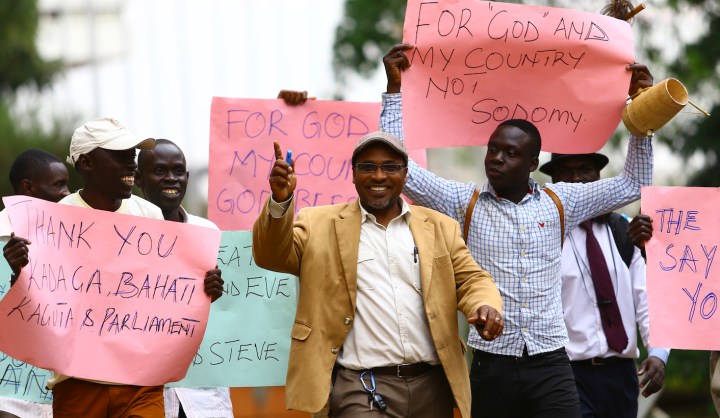Africa
GroundUp: What does Uganda’s ‘anti-gay’ law mean for gay people?

On 24 February 2014, Uganda passed legislation that criminalises homosexuality. Paul Semugoma, a gay Ugandan activist who recently gained temporary residence in South Africa, says that the legislation’s impact will be extensive among all Ugandan society. The legislation, according to Paul, is more about consolidating President Yoweri Museveni’s power ahead of the 2016 Ugandan elections than about dealing with any meaningful social ill. By Jonathan Dockney for GROUNDUP.
Semugoma had to leave Uganda, as he could not speak openly as a gay person. Semugoma worked in HIV prevention programmes among gay people in Uganda. He says that he had “all the science at my fingertips”, but he could not speak openly and honestly about HIV prevention. In 2012, he was invited to speak at an HIV/Aids conference in the United States. Once out of Uganda, he decided to come out, then seek residence in South Africa.
Coming out is a common term for telling another person that you are gay.
The legislation, commonly known as the “anti-gay bill”, makes homosexuality a criminal offence. It also makes it a crime to do anything that could be seen to “promote” it. Anyone found guilty for same-sex intercourse or marriage can be imprisoned for life. First-time offenders can receive a “lighter” sentence of 14 years’ imprisonment. Ugandan MPs have been reported as saying that homosexuality is just “bad behaviour”, which “must be unlearned”.
Semugoma says that the bill has expanded its scope and will have wide-ranging implications for Ugandan society as a whole. HIV prevention programmes that target gay people are criminalised under the new law. Landlords are also not allowed to have gay tenants. The final act has dropped an earlier provision that obligated anyone in a position of authority to report homosexual activity to the police within 24 hours.
Countries like the United States have criticized Uganda for passing the bill. The US has said that it will review its relationship with Uganda, including the approximately $400m in donor aid it gives to Uganda. According to a BBC report, Museveni is using the opportunity to demonstrate Uganda’s independence from Western powers. There is speculation that Uganda may seek donor aid from elsewhere, including Russia or China.
The South African government issued a statement on 25 February 2014 saying it “takes note of the recent developments regarding the situation of Lesbians, Gays, Bisexual, Transsexual and Intersex persons (LGBTI) worldwide… South Africa believes that no persons should be subjected to discrimination or violence on any ground, including on the basis of sexual orientation.” The statement, however, does not explicitly name Uganda.
Semugoma believes Museveni signed the bill into law because of “politicking”. Museveni is looking to win the 2016 elections and this legislation will allow him to consolidate his party before the elections. His party widely supports the act.
Semugoma also said that politicians find it useful to deflect social anger and frustration by blaming minorities, such as homosexuals. He says that the Ugandan public has been stirred up against the gay community over the years and that the stereotypical image of homosexuals in Uganda is one of an “ugly and evil person”.
According to Semugoma, violence against gay people has not changed much in Uganda, because most people do not come out as gay. However, he said that over the past three months, there have been increased incidents of people being reported to and arrested by the police for being gay.
One of the most powerful actions that the South African government and civil society can take, Semugoma said, is to openly stand in solidarity with gay Africans in places like Uganda. When the US or EU criticises an African country, they are easily “rubbished”, Paul said. However, when an African stands up for the rights of other Africans, that “resonates across the continent; there’s a power there.” DM
This story was first published on www.groundup.org.za
Photo: Ugandan anti-gay activist Pastor Martin Ssempa leads anti-gay supporters as they celebrate after Uganda’s President Yoweri Museveni signed a law imposing harsh penalties for homosexuality in Kampala February 24, 2014. (REUTERS/Edward Echwalu)


















 Become an Insider
Become an Insider